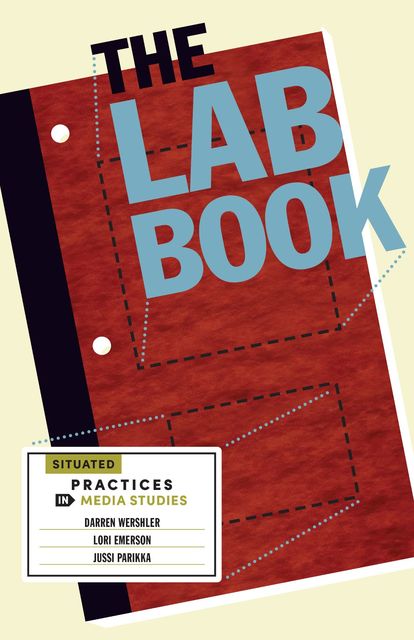Darren Wershler, Lori Emerson, Jussi Parikka: The Lab Book: Situated Practices in Media Studies (2022)
Filed under book | Tags: · apparatus, collaboration, computing, hackerspace, infrastructure, innovation, knowledge production, labour, management, media archeology, media labs, media studies, prototyping, race, research, space, technique, technology, university

“From the “Big Science” of Bell Laboratories to the esoteric world of séance chambers to university media labs to neighborhood makerspaces, places we call “labs” are everywhere—but how exactly do we account for the wide variety of ways that they produce knowledge? More than imitations of science and engineering labs, many contemporary labs are hybrid forms that require a new methodological and theoretical toolkit to describe. The Lab Book investigates these vital, creative spaces, presenting readers with the concept of the “hybrid lab” and offering an extended—and rare—critical investigation of how labs have proliferated throughout culture.
Organized by interpretive categories such as space, infrastructure, and imaginaries, The Lab Book uses both historical and contemporary examples to show how laboratories have become fundamentally connected to changes in the contemporary university. Its wide reach includes institutions like the MIT Media Lab, the Tuskegee Institute’s Jesup Wagon, ACTLab, and the Media Archaeological Fundus. The authors cover topics such as the evolution and delineation of lab-based communities, how labs’ tools and technologies contribute to defining their space, and a glossary of key hybrid lab techniques.”
Publisher University of Minnesota Press, March 2022
ISBN 9781517902179, 1517902177
x+333 pages
Project website
Publisher
WorldCat
HTML (Manifold)
Comment (0)Precarity Lab: Technoprecarious (2020)
Filed under book | Tags: · care, class, gig economy, labour, precarity, technology, work

“An analysis that traces the role of digital technology in multiplying precarity.
Technoprecarious advances a new analytic for tracing how precarity unfolds across disparate geographical sites and cultural practices in the digital age. Digital technologies—whether apps like Uber, built on flexible labor, or platforms like Airbnb that shift accountability to users—have assisted in consolidating the wealth and influence of a small number of players. These platforms have also exacerbated increasingly insecure conditions of work and life for racial, ethnic, and sexual minorities; women; indigenous people; migrants; and peoples in the global south. At the same time, precarity has become increasingly generalized, expanding to include even the creative class and digital producers themselves.
This collaboratively authored multigraph analyzes the role of digital technology in multiplying precarity. The authors use the term precarity to characterize those populations disproportionately affected by the forms of inequality and insecurity that digital technologies have generated despite the new affordances and possibilities they offer. The book maps a broad range of digital precarity—from the placement of Palestinian Internet cables to the manufacture of electronics by Navajo women and from the production and deployment of drones on the U.S.–Mexico border to the technocultural productions of Chinese makers. This project contributes to, and helps bridge, ongoing debates on precarity and digital networks in the fields of critical computing, postcolonial studies, visual culture, and information sciences.”
Publisher Goldsmiths Press, London, November 2020
Creative Commons BY-NC-ND 4.0 International License
ISBN 9781912685981, 1912685981
xi+113 pages
Neda Atanasoski, Kalindi Vora: Surrogate Humanity: Race, Robots, and the Politics of Technological Futures (2019)
Filed under book | Tags: · artificial intelligence, automation, capitalism, colonialism, ethics, feminism, labour, liberalism, machine, military, race, robotics, robots, technology, women, work

“In Surrogate Humanity Neda Atanasoski and Kalindi Vora trace the ways in which robots, artificial intelligence, and other technologies serve as surrogates for human workers within a labor system entrenched in racial capitalism and patriarchy. Analyzing myriad technologies, from sex robots and military drones to sharing-economy platforms, Atanasoski and Vora show how liberal structures of antiblackness, settler colonialism, and patriarchy are fundamental to human—machine interactions, as well as the very definition of the human. While these new technologies and engineering projects promise a revolutionary new future, they replicate and reinforce racialized and gendered ideas about devalued work, exploitation, dispossession, and capitalist accumulation. Yet, even as engineers design robots to be more perfect versions of the human—more rational killers, more efficient workers, and tireless companions—the potential exists to develop alternative modes of engineering and technological development in ways that refuse the racial and colonial logics that maintain social hierarchies and inequality.”
Publisher Duke University Press, Durham, NC, March 2019
Perverse Modernities series
ISBN 9781478003861, 1478003863
x+240 pages
Interview with authors: Lesia Pagulich, Tatsiana Shchurko (Feminist Critique, 2019).
Reviews:Sibille Merz (Ethnic & Racial Studies, 2019), Barbara Herr Harthorn (American Ethnologist, 2020), Anita Lam (Surveillance & Society, 2020), Andrea Flores (Information & Culture, 2020), Raquel Bosó Pérez (Sociology of Health & Illness, 2020), Nina Trige Andersen (Modern Times, c.2020), Kevin Pabst (Security Journal, 2020).
Comment (0)
